When Jacob came out of Padanaram, in the land of Shechem (Genesis 33:18), and arrived at Bethel, God reappeared to him and blessed him. After blessing him, what God does first is He renames Jacob and tells him that he shall no longer be called Jacob, but he will be called Israel. Note, this is the second time God is renaming Jacob; the first time was when Jacob encountered and wrestled with God (Genesis 32:28). Juxtaposing Jacob’s renaming, God reveals a name by which Jacob is to know him by. God identifies himself as El Shaddai (God Almighty).
Some observations that are noteworthy include:
1. When Jacob wrestled with God, he clung to God and refused to let go, pleading to be blessed (Genesis 32:26). Here without any plea, God takes the initiative to bless Jacob. Jacob’s act of obedience to move out of his house, from a land that he ought not to have remained (Genesis 33:17), to a place that he recognized was the House of God (for he called it Bethel) resulted in blessings (Genesis 35:9). In Hebrew, beth means house, and El is used for God – Elohim.
2. The renaming of Jacob, a second time, I believe is a reminder for Jacob to change his life, his ways. Note, even after God had told him that he would be called Israel (Genesis 32:28), Jacob’s lifestyle had not changed. Jacob was given a name change, but he did not have a heart change. Even after his brother had reconciled with him, Jacob continued to deceive him by lying to him and telling him that he will follow Esau to where Esau was going, but instead, he went to Padanaram in Shechem and made for himself a house and booths (tents which in Hebrew is Succoth) for his cattle (Genesis 33:12-17), deceiving his brother again and disobeying God, putting himself and his family in danger. He continued to live up to his old name, Jacob, which meant deceiver (supplanter), as was evident from his lies to his brother. God had to remind him that he was no longer to be called Jacob but henceforth known as Israel, meaning that he will have to change his ways and live as one who struggles with God (which is what Israel means) and cling on, refusing to let go, to enjoy God’s blessings.
3. When Jacob wrestled with God, Jacob asked for God’s name but did not receive an answer. Instead, he was asked what his name was and Jacob had to confess and admit that he was Jacob, Until then he had to live with his brother’s name that he had used to deceive his earthly father. Here God, the heavenly father (Matthew 18:14), does not ask for Jacob’s name but instead renames him (again). Following that, though unsolicited, God reveals to Jacob that he shall be known to Israel as El Shaddai, meaning God Almighty. Israel was to experience the Almighty (omnipotent) essence of God. Later God would make a mention of this to Moses, when he will reveal to Moses, of his essence of being, not just as being Almighty, but All-all-things as he will reveal his name as the Great I AM (Yahweh) (Exodus 6:2-3).
Points to Ponder:
God reappears to us time and again, through his word, as the Spirit of God illuminates the Scripture unto us and blesses us when we walk according to His commands and ways. Those who believe in Jesus Christ are a new creation and bear (represent) the name of God. We ought not to walk in our old ways, deceiving others and deceiving ourselves (James 1:22). As we walk about in God’s ways, we will get to experience the Omnipotent God – God Almighty – the El Shaddai – in our lives.
Has God appeared to you? In other words, have you encountered Jesus, in whom the fullness of God dwells (Colossians 2:9), and have you believed in Him? If not, do not delay and put your life and the life of your loved ones in danger, for now (today) is the appointed time for you to encounter God (2 Corinthians 6:2). Believe and be blessed as God appears to you in his word and is revealed in Jesus Christ to make you new and give you a new name – as son or daughter of God.
Genesis 35:9-15 (KJV)
9 And God appeared unto Jacob again, when he came out of Padanaram, and blessed him.
10 And God said unto him, Thy name is Jacob: thy name shall not be called any more Jacob, but Israel shall be thy name: and he called his name Israel.
11 And God said unto him, I am God Almighty: be fruitful and multiply; a nation and a company of nations shall be of thee, and kings shall come out of thy loins;
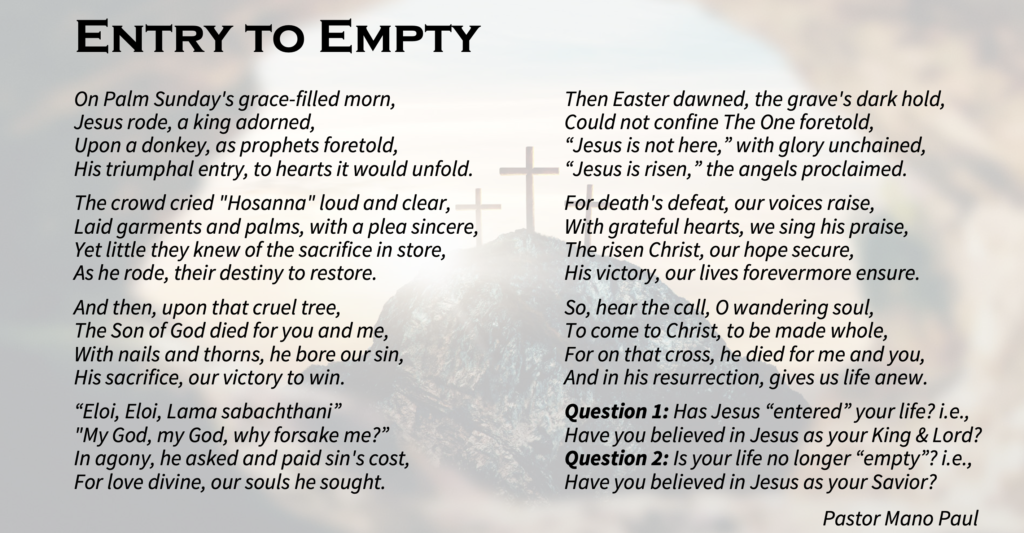


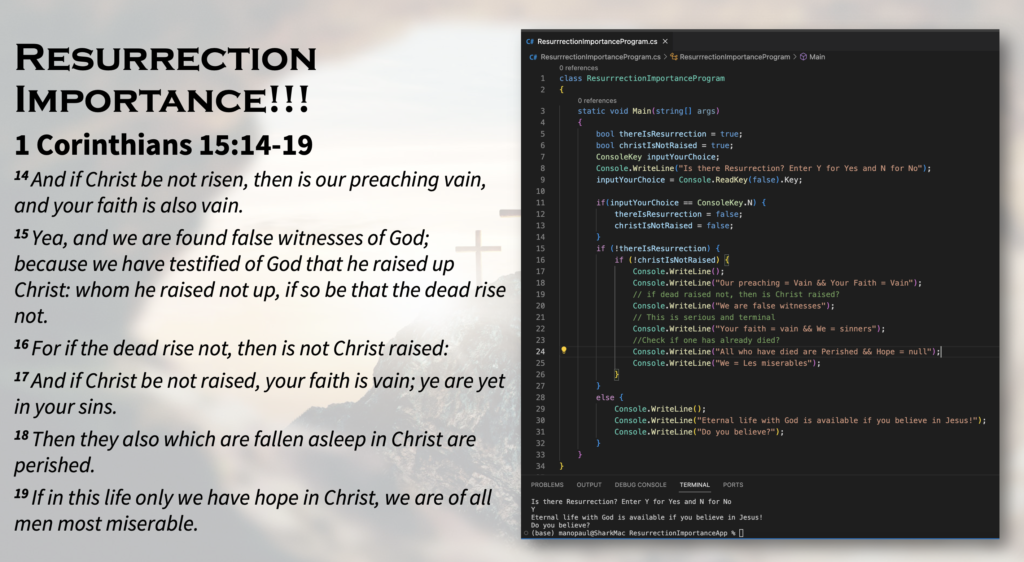
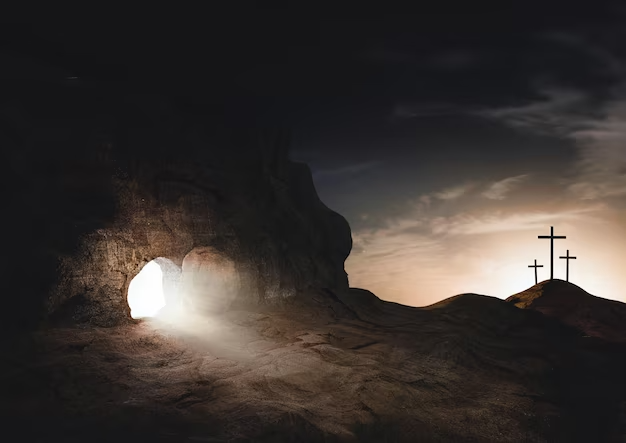
 After the resurrected Jesus appears to Mary Magdalene and commissions her to go tell his brothers of his impending ascension, he appears to his disciples, behind closed doors (John 20:19). He shows his disciples his hands and his pierced side, which dispelled their fears and brought gladness to them (John 20:20). Careful scrutiny of this pericope reveals that the display of his resurrected body is sandwiched between two expressions of “Peace” (John 20:19,21).
After the resurrected Jesus appears to Mary Magdalene and commissions her to go tell his brothers of his impending ascension, he appears to his disciples, behind closed doors (John 20:19). He shows his disciples his hands and his pierced side, which dispelled their fears and brought gladness to them (John 20:20). Careful scrutiny of this pericope reveals that the display of his resurrected body is sandwiched between two expressions of “Peace” (John 20:19,21).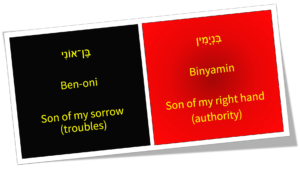

 God blesses Jacob, renames him as Israel and upon revealing Himself as God Almighty, God gives the command to Jacob to be fruitful and multiply and promises him that nations and kings shall come from his loins (Genesis 35:11). God then promises to give to Jacob and to his seed after him, the land and seed that he had given to Abraham and Isaac (Genesis 35:12). After God had spoken with him, God ascended from where he was (Genesis 35:13).
God blesses Jacob, renames him as Israel and upon revealing Himself as God Almighty, God gives the command to Jacob to be fruitful and multiply and promises him that nations and kings shall come from his loins (Genesis 35:11). God then promises to give to Jacob and to his seed after him, the land and seed that he had given to Abraham and Isaac (Genesis 35:12). After God had spoken with him, God ascended from where he was (Genesis 35:13).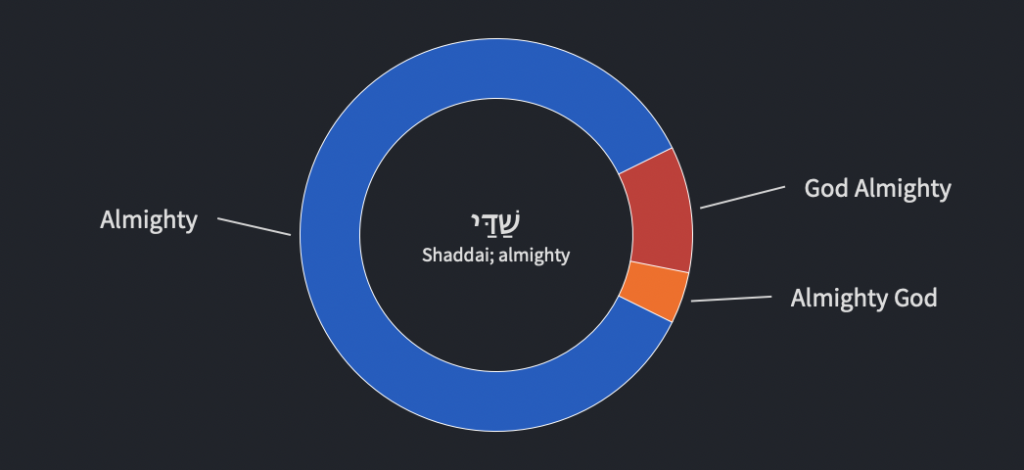 Juxtaposing Jacob’s renaming, the second time, in Bethel (Genesis 35:10), God reveals a name by which Jacob is to know him by. God identifies himself as God Almighty which in Hebrew is El Shaddai (Genesis 35:11).
Juxtaposing Jacob’s renaming, the second time, in Bethel (Genesis 35:10), God reveals a name by which Jacob is to know him by. God identifies himself as God Almighty which in Hebrew is El Shaddai (Genesis 35:11).